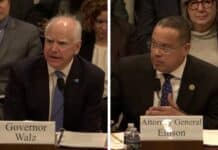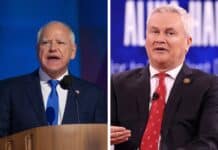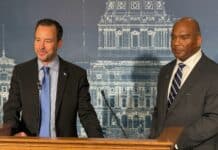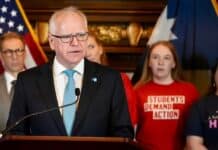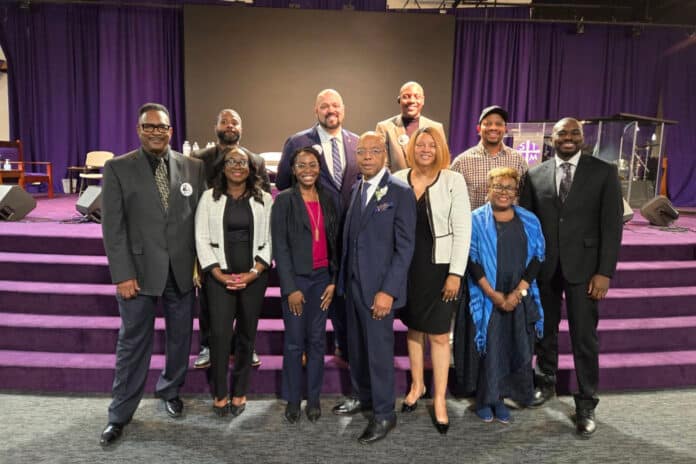
The word “privilege” has taken on a negative connotation in recent years, signaling cause for shame. We’re meant to atone for unearned privilege and pay restitution to those who have not enjoyed it.
But I embrace my privilege with pride. It’s true, I didn’t earn the privilege of being born an American at the dawn of an age of national excellence, two-years old upon the election of Ronald Reagan, 10 years past the overturning of state laws which would have forbade my parents to marry, more than a century past the Emancipation Proclamation, more than two centuries past the Declaration of Independence. I didn’t earn any of that. But it was earned by others. And they did so willingly under the premise that their posterity was their responsibility.
That’s privilege in a nutshell, bequeathment, legacy. It’s nothing to be ashamed of, but rather respected and honored. It’s something to live up to, not live down.
Nevertheless, as a black conservative serving my first-term in the Minnesota House of Representatives elected as a Republican from a 96%-white district, I recognize an opportunity to parlay my unique identity to open doors others may not. That is why I have chosen to join the Executive Board of the newly stood up Frederick Douglass Foundation Minnesota, and work to engage black Minnesotans with the promise of limited government and free market principles.
But the message needs massaging. Some years ago, I supported the efforts of my friend and then U.S. Senate candidate Dan Severson to engage in “community outreach” to minority populations throughout the state. Dan made significant inroads with the Somali, Hmong, and Hispanic communities around the Twin Cities. But he struggled to connect with Foundational Black Americans, those directly descended from chattel slave ancestors. He also struggled to earn support from conventional Republican donors to buoy his outreach efforts.
In retrospect, perhaps Dan, a strait-laced Caucasian retired Navy fighter pilot, was not the ideal spokesperson for the cause. But subsequent efforts at minority engagement by conservative movements and Republican campaigns have not proven significantly more successful.
As an observer of these efforts, and now an active participant in the process, I suggest two likely causes for our impasse.
First, many conservatives and Republicans I talk to offer a cold-shoulder to the notion of black engagement. They like me well enough. They like other black conservatives like Kendall Qualls, Cicely Davis, or Candace Owens. But they like us because we speak their language. We speak patriotic American. We echo boilerplate beliefs. They like us, in short, because they didn’t have to do any work to earn us.
That’s a problem.
Politics requires work. Consider the smallest of campaigns, somebody seeking a position on city council. You have to get your name in front of people. You have to knock on doors. You have to raise a little bit of money, buy some signs, pound them into the ground, etc. What you can’t do, although I have certainly seen some try, is simply file your candidacy and sit back waiting for voters to come to you. It doesn’t work that way.
Yet that is precisely the approach prescribed by many Republicans of influence who I have spoken to regarding engagement with the black community.
“Meh, they aren’t voting for us anyway.”
“They’re free to vote for us anytime they want.”
“They should vote for us because <reasons>.”
Sorry, but these aren’t arguments. No competent campaign manager would incorporate these sorts of assumptions into their political strategy. Meh, miners will come vote for us if they know what’s good for them, said no Iron Range campaign manager ever.
We have to engage. That means nothing more complex than we have to listen. We have to hear people’s stories and glean from their stories opportunities to formulate solutions to their problems which meet them where they are.
That is the guiding principle which informed a recent event held in the heart of North Minneapolis by the Fredrick Douglass Foundation Minnesota. The Executive Board, led by FDFMN President and former congressional candidate Lacy Johnson, brought in civil rights leader and Woolworth’s lunch counter sit-in participant Clarence Henderson to connect the dots between Jim Crow and modern disparities evident in Minnesota’s child protection services.
Black children are significantly more likely to be separated from their parents and communities under circumstances which prove materially similar to those of white children who nevertheless remain with their families. It’s a fact that we, as conservatives, flinch from acknowledging, because we have been trained like Pavlov’s dog to respond negatively to any mention of disparity. Consider, however, that the effect of our instinctive rejection of statistical reality prevents us from applying our limited government principles to the question of racially-motivated government overreach.
Before the close of this year’s legislative session, we will consider and pass the African American Family Preservation Act, a bill authored by my Democratic colleague Rep. Esther Agbaje. The bill wilts somewhat under scrutiny and proves less than perfect. But it will go some distance toward ensuring that black children remain with their families and in their communities, something which conservatives should value. That’s why I have signed on as a co-author and will stand in support of the bill when it comes to the House floor.
Such unconventional opportunities to seek dialogue with black Americans must be actively sought if we ever hope to break the stranglehold Democrats have on their vote. While it’s true that many black Americans are deeply disenchanted with Democrats like Joe Biden, that will not necessarily translate to them voting for Republicans. And they won’t cast that vote unless it is earned in the manner every other vote is earned, through hard and persistent work.
Consider supporting the Frederick Douglass Foundation Minnesota by becoming a member, visit our website at fdfmn.org, and look for our booth at the Republican Party state convention on May 17-18.
Rep. Walter Hudson is a Republican state representative from Albertville.

